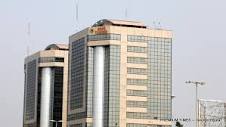The Conference Committee which was set up by the Two Chambers of the National Assembly to harmonise the Bill for an Act to establish the Nigeria Peace Corps has been adopted by the senate
The Committee that was set up earlier in the year by both the Senate and House of Representatives completed it’s assignment last week and the version of the Bill as passed by the House of Representatives was adopted by the Senate.
Highlight of the adopted report is on clause 38 (1) of the version passed by the Senate which is in conflict with the version passed by the House of Representatives as contained under clause 38 (1).

Whereas the Senate’s version seeks dissolution of the existing Peace Corps of Nigeria and National Unity and Peace Corps, the House of Representatives version of the Bill solely recommends the dissolution of the existing Peace Corps of Nigeria to be transformed into the Nigerian Peace Corps when assented to President Buhari.
The Conference report clarified that for a Bill to become an Act of Parliament in Nigeria, it must pass through the two Chambers of the National Assembly, a criteria which the National Unity and Peace Corps Bill could not attain because its Bill was never debated unlike that of the Peace Corps of Nigeria debated and passed by the two Chambers.
However, the Bill for an Act to establish the Nigeria Peace Corps expressly provided under clause 38 (8) a window of opportunity for individuals, groups, associations or bodies that show or demonstrate interest to be absorbed as members of the Corps shall be absorbed subject to the mandatory basic training and orientation program of the Corps as may be prescribed from time to time when the Bill is signed into law.
It will be recalled that the Nigeria Peace Corps (NPC) Establishment Bill passed in 2022 by the two Chambers was sponsored by the Chairman, Senate Committee of the Nigerian Army, Senator Ali Ndume while that of the House of Representatives was sponsored by the Chief Whip, Rt. Hon. Mohammed Monguno as HB17
The Bill, among others, seeks to establish the Nigerian Peace Corps as a body charged with the responsibility to develop, empower and provide gainful employment to youths, facilitate peace, volunteerism,, Community Service, Neighborhood Watch and Nation building.
According to part Vlll of the passed Bill, when assented to by President Buhari, would give statutory backing to the existing Peace Corps of Nigeria.
The adoption of the Report by both the Senate and the House of Representatives has brought to its logical conclusion every legislated process involved in the enactment of a Bill has however cleared the coast for the transmission of this all-important Bill to Mr President for assent.
The Peace Corps of Nigeria established over 24 years ago under the National Commandant, Professor Dickson Ameh Akoh is Incorporated in Nigeria under the Company and Allied Matters (CAMA) Act and accorded the Federal Government recognition through the Federal Ministry of Youth Development.
Due to the value driven programs of the Corps, aimed at the socio-economic empowerment of the Nigerian youths and its onerous contributions to peace building and advocacy, the United Nations in 2011 accorded the organization a Special Consultative Status while the African Union in 2016 accorded same status to the organization, thus, making it a member of the Social and Economic Councils of both the United Nations and the African Union.
So far, the organization has a well structured network of offices in the 36 States of the Federation and the Federal Capital Territory FCT.



